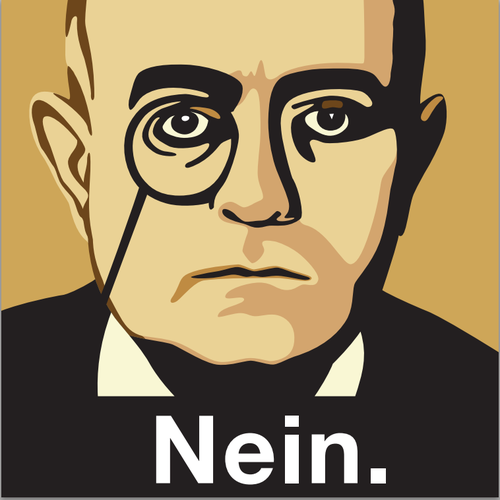
An Interview with Eric Jarosinski
Whenever Eric Jarosinski ran late for our class (“Nietzsche’s Modernity”) at the University of Pennsylvania, he’d invariably send us mass emails with subject lines like, “Thus was Zarathustra 10-15 mn late.” Or after news of a snow day: “Die Another Day. In Venice.” For an email ominously titled “Krank,” he’d add, “That’s German for sick. Because that’s how bad I’m feeling right now.”
That constant impulse to write playful, incisive, well-punctuated aphorisms has made Jarosinski a Twitter phenomenon. He has almost 88,000 followers, an incredibly large number considering Jarosinski’s favorite topics include hermeneutics (“Another beautiful day for signifying nothing”) and grammar (“An Oxford comma walks into a bar. Orders a gin, and tonic.”) Under the handle Nein Quarterly, a fictional magazine that may soon become real, Jarosinski takes on the persona of “Nein,” a zeppelin-flying alter ego of Theodor W. Adorno that turns a critical, monocled eye on the world.
Jarosinski’s tongue-in-cheek self-identification as a #FailedIntellectual after he decided to leave academia resonates with an audience looking to think outside traditional academic boundaries. His most earnest tweets come when promoting crowd-sourced or free resources for thought, like the avant-garde UbuWeb or the “PDF library” Arg Dot Org.
Our interview took place over email; he responded on various Apple devices.
—Brenda Wang
I. MAYBE WATCH A WERNER HERZOG DOCUMENTARY
THE BELIEVER: You’ve recently inked a book deal for NEIN. A MANIFESTO, which means you’re moving back to writing books, this time in “small but potent clusters of text.” What does that mean exactly? Is Nein really Nein without Twitter?
ERIC JAROSINKI: Embarrassing. I don’t really know. That’s promotional text I didn’t write myself. I think it means “short but good.” That’s what I’ve been trying to write anyway, with varying degrees of success.
And yes, Nein is still Nein without Twitter, at least in spirit, but not exactly in form. I am trying to write for the book as a medium, just as I’ve tried to learn to write for Twitter as a medium. I know nothing about music, but I’m tempted to say something about tweets being about dissonance and sharp counterpoints, but for print I’m trying to think more in terms of composition, maybe some sort of little textual fugues. Uh, small but potent clusters of, uh, textual fugues.
BLVR: The promotional text on Lebowski Publishers’ website says that the book will, “As good old Horace would have put it, instruct and delight in equal measure.” That seems a little medieval for Nein—what are you hoping to instruct readers about?
EJ: You’ll have to ask my agent. The only thing I’ve ever tried to teach is a type...
You have reached your article limit
Sign up for a digital subscription and continue reading all new issues, plus our entire archives, for just $1.50/month.
Already a subscriber? Sign in




